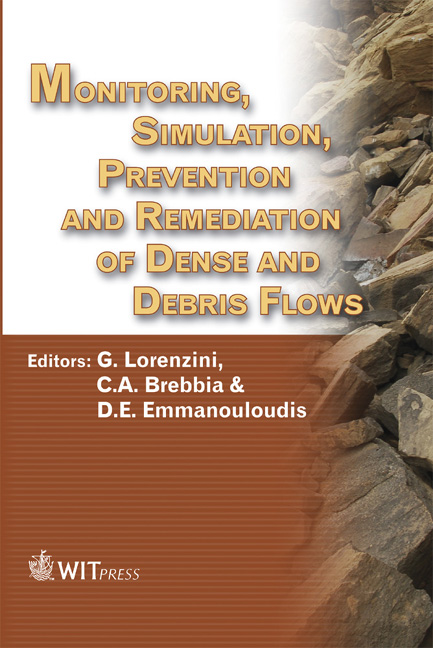Research Developments In Debris Flow Monitoring, Modelling And Hazard Assessment In Italian Mountain Catchments
Price
Free (open access)
Transaction
Volume
90
Pages
11
Published
2006
Size
445 kb
Paper DOI
10.2495/DEB060141
Copyright
WIT Press
Author(s)
M. A. Lenzi
Abstract
Debris flows play an important role among natural hazards in the mountainous areas of Italy. This paper provides an overview of the recent research on debris flows conducted in Italy, taking into account both hydraulic and morphological studies. Moreover, the most encouraging research perspectives in this field are briefly presented, such as the monitoring in instrumented basins, the geotechnical analysis of the processes leading to debris flow initiation and modelling. Finally, three study cases are reported, with the aim of outlining the main characteristics of these phenomena and the consequent risk conditions in representative sites in the Italian mountains. Keywords: Italy, debris flow, monitoring, natural hazards, modelling. 1 Introduction Italy is a peninsula in southern Europe, whose territory covers 301,277 km 2 and of which 75% consists of mountainous or hilly areas. Relief is high and differentiated: peaks on the Alps (Northern Italy) range between 2,700 and 4,800 m a.s.l., while on the Apennines (Central and Southern Italy), they vary between 2,000 and 2,800 m a.s.l. The Po River is the longest water course (652 km) and it crosses Northern Italy in an E-W direction, draining a basin of about 70,000 km 2 Its average annual runoff is about 660 mm; higher peak discharges reach values of about 10,000 m 3 s -1 [1]. The Alps originated by compression and foreshortening of the margins between Africa and Europe. This processes of crustal shortening, which began in the late Mesozoic era (Upper Cretaceous) and continues up to the present, has led to the formation of thrust nappes of the crystalline basement and of its sedimentary cover complexes (carbonates, marls
Keywords
Italy, debris flow, monitoring, natural hazards, modelling.





